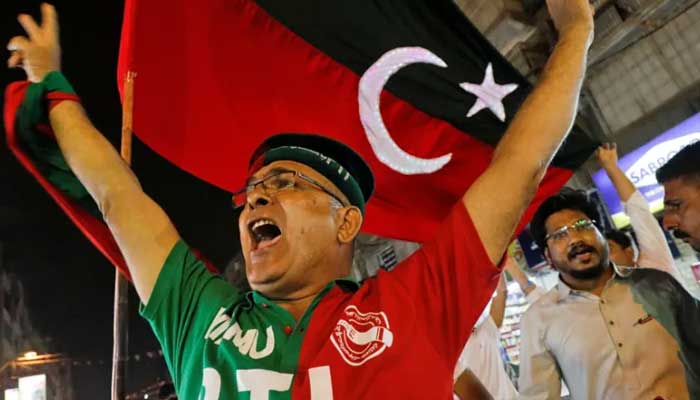- Imran Khan to address his supporters and warn of “real danger”.
- PTI will celebrate victory in SC verdict in 21 cities across Sindh.
- Only three cities in KP to celebrate party’s “thanksgiving day”.
After the Supreme Court issued its verdict in favour of Pakistan Tehreek-e-Insaf (PTI) in the election delay case a day earlier, the former ruling party Wednesday announced celebrating “thanksgiving day” across the country’s four provinces tonight.
PTI Chairman Imran Khan, taking to Twitter, wrote that his party will celebrate Youm-e-Tashakkur in over 75 cities across the four provinces after Isha prayer tonight.
The country’s top court, on Tuesday, in its unanimous verdict declared the Election Commission of Pakistan’s (ECP) decision on the Punjab and Khyber Pakhtunkhwa (KP) election null and void, ordering the electoral authority to hold snap polls issuing May 14 as the date for Punjab.
The court’s judgement came as a result of a plea filed by the PTI against the ECP following the party’s persistent demand of conducting polls, particularly in Punjab and KP — where the PTI had ended their government after dissolving the provincial assemblies.
The ECP, earlier today, announced its polls schedule with the date of polling mentioned as May 14.
He added that the apex court stood with the Constitution and put an end to the doctrine of necessity. Khan deemed it a huge step towards Haqeeqi Azadi (true freedom).
“SC has stood with Constitution & put an end to Doctrine of Necessity, which is used in absence of Rule of Law. This is also a huge step forward towards Haqeeqi Azadi,” Khan tweeted.
The former prime minister, who was ousted from office after a no-confidence motion in April last year, also stated that he will address his people and warn them about the “real danger”. He added that despite the top court’s order, the “ruling mafia” will avoid conducting elections owing to their fear of losing.
“I will address our ppl & warn of the real danger that, despite SC order, ruling mafia will still not hold elections bec they are petrified of losing. We must be prepared to come out on the streets for peaceful protest in support & protection of SC, which is upholding Constitution,” Khan wrote in his tweet.
Khan insisted his workers and supporters remain prepared for taking to the streets for “peaceful protests” for supporting and protecting the Supreme Court.
“We must be prepared to come out on the streets for peaceful protest in support & protection of SC, which is upholding the Constitution.”
The party’s Secretary General Asad Umar, meanwhile, also shared the update about PTI’s celebration following the SC judgement.
“Thanksgiving day will be celebrated in all four provinces tonight in the context of the Supreme Court’s decision,” PTI Secretary General Asad Umar said.
The party has posted a tweet informing its workers and supporters about the locations where they can gather for the celebration with most number of protests taking place in Sindh’s 21 cities, followed by 19 in Balochistan, 13 in Punjab and three in Khyber Pakhtunkhwa.
In Sindh PTI’s gatherings will take place in Karachi, Hyderabad, Thatta, Sujawal, Tando Allah Yar, Dadu, Badin, Tando Mohammad Khan, Matiari, Mirpurkhas, Umerkot, Tharparkar, Nawabshah, Sanghar, Sukkur, Jacobabad, Shikarpur, Qambar, Jamshoro, Ghotki and Kahirpur.
Balochistan’s cities which will witness celebration by the Khan-led party include Quetta, Zhob, Dukki, Ziarat. Qilla Abdullah, Harnai, Jaffarabad, Naseerabad, Usta Mohammad, Sohbatpur, Lasbela, Loralai, Khuzdar, Jhal Magsi. Barkhan, Pishin, Sherani, Musakhel and Qilla Saifullah.
In Punjab celebrations will take place in Lahore, Gujranwala, Sheikhupura, Rawalpindi, Sargodha, Faisalabad, Jhang, Chiniot, Sahiwal, Okara, Pakpatan, Multan and Bahalwalpur.
Meanwhile, only three cities in KP comprising Peshawar, Swat and Abbotabad will see the PTI celebrate thanksgiving day.


 Entertainment2 days ago
Entertainment2 days ago
 Latest News2 days ago
Latest News2 days ago
 Latest News2 days ago
Latest News2 days ago
 Latest News2 days ago
Latest News2 days ago
 Latest News2 days ago
Latest News2 days ago
 Entertainment2 days ago
Entertainment2 days ago
 Latest News2 days ago
Latest News2 days ago
 Business23 hours ago
Business23 hours ago























